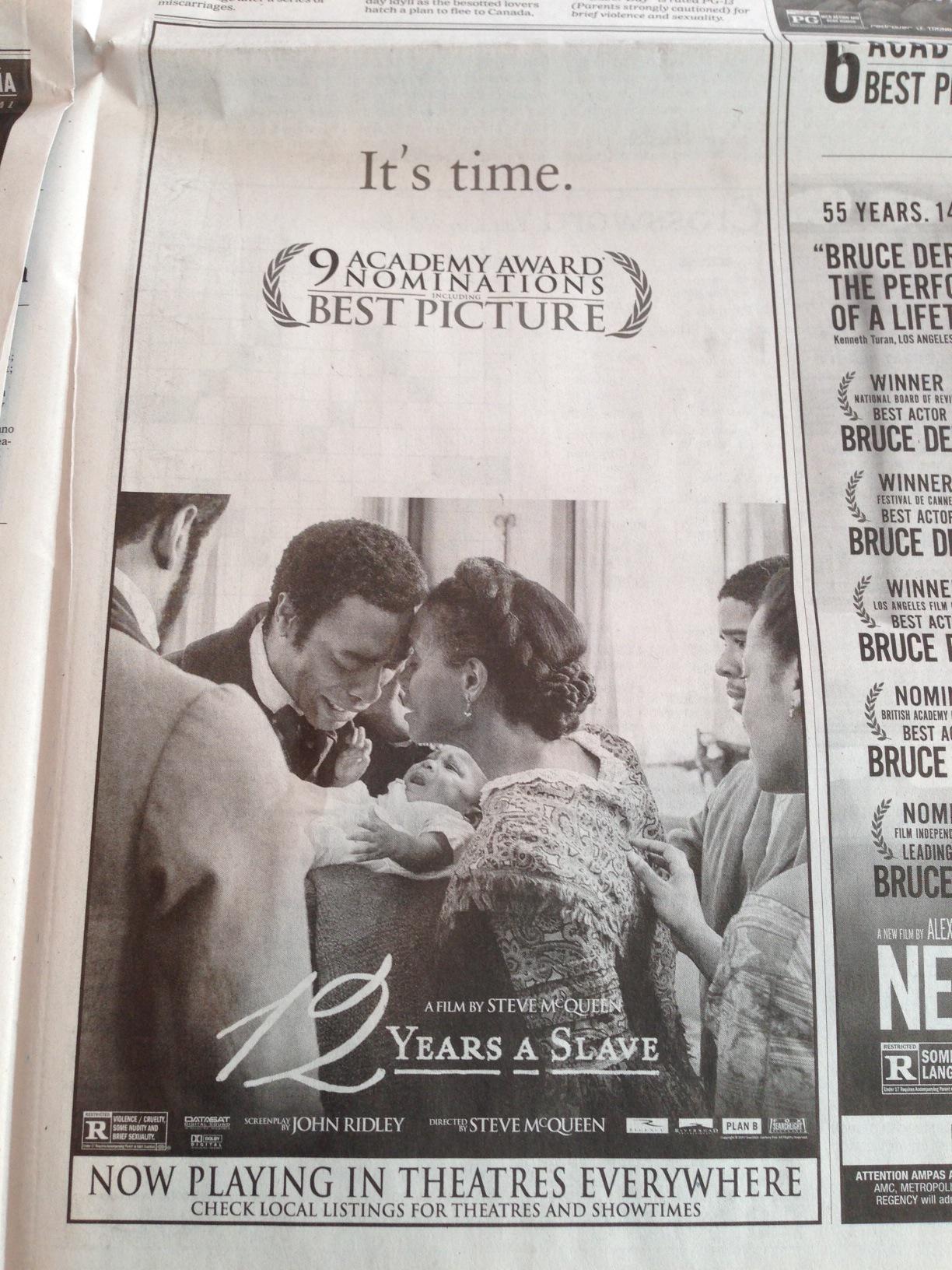A quarter-page ad for 12 Years a Slave appears in the New York Times today, and it follows a familiar pattern for films of its caliber. It prominently touts its nine Oscar nominations, including one for Best Picture; displays a still from the stirring final scene of the film in which Solomon Northup is reunited with his family after being held in slavery; and announces in all-caps that it’s “now playing in theaters everywhere.”
Oh, and it also declares, at the top of the ad in the largest font, “It’s time.”

Photo courtesy of Dan Kois
What does “It’s time” mean, exactly? And who is the target audience of this statement? My colleagues and I debated these questions all morning, and there are conflicting opinions. One possibility is that the ad is directed at those who think they should see the movie but are put off by its depressing themes and stark realism. This is a real phenomenon: I know a handful of would-be viewers who have professed reluctance to see 12 Years a Slave, even though they think they should. Cord Jefferson at Gawker has remarked on his friends’ squeamishness about the film as well. And one post from the film’s Facebook page features the caption, “IT’S TIME to experience 12 Years a Slave,” with a link to buy tickets, which would seem to corroborate this interpretation of the Times ad.
But there are other possible readings of “It’s Time.” The initial assumption of one colleague upon seeing the ad was that the phrase is “just a bit of a play on the title and the plotline of a slave finally being restored to freedom.” This is also a plausible explanation—time, and more specifically, the passage and loss of time, are central themes of 12 Years a Slave.
And then there’s the more cynical interpretation: That the ad is saying that it’s time for a movie about slavery, and with a significantly black cast and crew, to be recognized by the Academy of Motion Picture Arts and Sciences. The implication of this reading is that the Academy ought to atone for the egregious wrongs of yesteryear, from the multiple awards given to the painfully racist Gone With the Wind to the slap-in-the-face Best Picture win of Driving Miss Daisy in the year of Do the Right Thing (which, embarrassingly, wasn’t even nominated in that category).
The phrase’s placement directly above its Oscar nominations mention in the ad supports the idea that it’s a coded message to the Academy. It’s unclear whether the ad is running in any papers outside of New York or Los Angeles, where Academy voters are most likely to reside. If not, this seems like a pretty clear instance of imploring Academy members to vote for 12 Years a Slave. Update, Feb. 1, 2014: Michelle Hooper, executive vice president of marketing at Fox Searchlight, tells me that the ad “is running all across the country and also all throughout Canada.”
This wouldn’t be the first time the publicity team behind 12 Years a Slave has implied that potential viewers have a moral imperative to see the film. In a recent cringe-worthy ad, the film’s trailer is mashed up with audio of Martin Luther King’s “I Have a Dream” speech, tying two of America’s favorite morally unambiguous moments in black history—slavery and the Civil Rights Movement—into an obvious, irresistibly neat little package.
Whether the target is the public, voters, or both, the campaign has felt less like a championing of the film on its merits and more like the implication of moral obligation, and that’s unfortunate. No one likes to be told they must see a film, or else suffer the pangs of guilt and self-loathing—and in this case, it minimizes the many other valid reasons to see it. Should those who are hesitant suck it up and see this beautiful, powerful, and important film? Yes. But they shouldn’t be guilt-tripped into it.